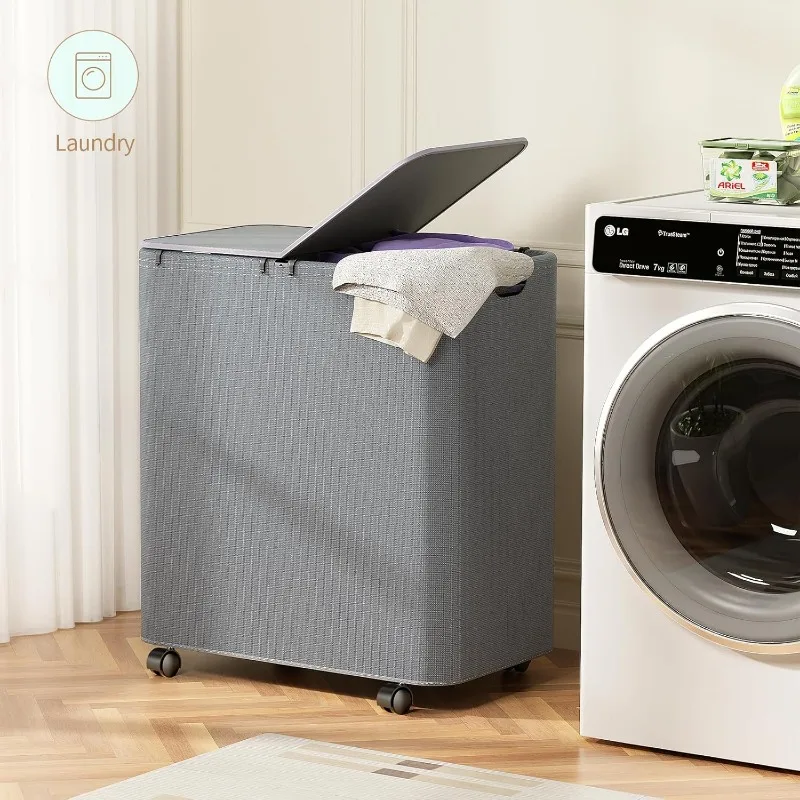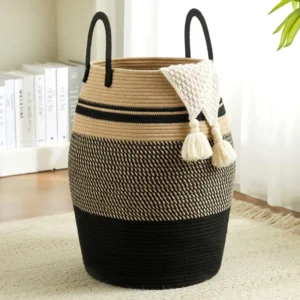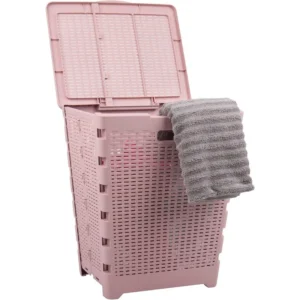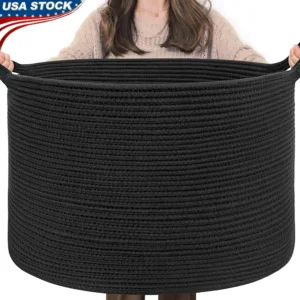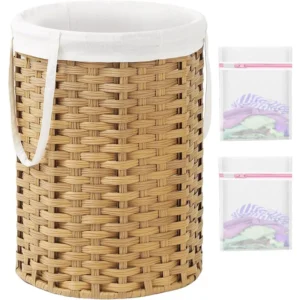Understanding “Hamper” in American English
Have you ever found yourself confused by what Americans call a “hamper”? If you’re from another English-speaking country, you might picture something quite different than what an American imagines when using this word. This confusion is a perfect example of how English terminology can vary significantly between regions, despite sharing the same language.
In American English, the word “hamper” primarily refers to a container used for storing dirty laundry. This is quite different from British English, where a “hamper” might more commonly bring to mind a wicker basket filled with food and gifts. These regional differences in terminology can lead to amusing misunderstandings between international friends or travelers.
The word “hamper” actually has multiple meanings in American usage, though one definition dominates in everyday conversation. Understanding these differences between hampers and baskets helps clarify how Americans typically use these terms and can prevent confusion when shopping or conversing across cultural boundaries.
In the following sections, we’ll explore the various ways Americans use the term “hamper,” focusing primarily on its most common application in the context of laundry, while also examining other meanings that might be less familiar to international English speakers.
The Laundry Hamper: America’s Primary Definition
In the United States, when someone mentions a “hamper,” they’re almost certainly referring to a container designed specifically for holding dirty clothes until laundry day. The American laundry hamper typically has several defining characteristics:
- Usually taller than it is wide, often rectangular or cylindrical in shape
- Frequently features a lid to conceal dirty clothes and contain odors
- May include ventilation holes or slats to prevent mustiness
- Often placed in bathrooms, bedrooms, or laundry rooms
- Designed to stay in one fixed location rather than being regularly moved around
American laundry hampers come in a wide variety of materials, with the most popular being:
- Wicker or rattan (traditional and decorative)
- Plastic (durable and easy to clean)
- Canvas or fabric (collapsible and lightweight)
- Wooden (more furniture-like and aesthetic)
Common phrases you’ll hear Americans use include “toss it in the hamper,” “the hamper’s full,” or “I need to empty the hamper,” all referring to this laundry-specific container. This usage is so prevalent that many Americans might be momentarily confused if you used “hamper” in a different context without clarification.
The design and functionality of wicker laundry hampers in particular have become staples in American homes, offering both practical storage and decorative elements that blend with interior design.
Laundry Hamper vs. Laundry Basket: The American Distinction
Many non-Americans might wonder if “laundry hamper” and “laundry basket” are simply interchangeable terms in American English. While some Americans do use them interchangeably in casual conversation, there is actually a distinct difference between these items in typical American usage:
| Feature | Laundry Hamper | Laundry Basket |
|---|---|---|
| Primary Purpose | Storage of dirty clothes | Transport of clean/dirty clothes |
| Design | Taller, often with lid | Wider, usually open-topped |
| Mobility | Stationary, stays in one place | Portable, designed to be carried |
| Location | Bathroom/bedroom | Moves between laundry room and bedrooms |
| Materials | Often wicker, wood, or decorative materials | Typically plastic or lightweight materials |
In a typical American household routine, clothes are placed in the hamper until laundry day. When it’s time to do laundry, the contents are often transferred to a laundry basket to be carried to the washing machine. After clothes are washed and dried, they may be placed back in the same basket (or a different one designated for clean clothes) for transport back to bedrooms or closets.
This functional distinction explains why Americans tend to select different designs for each purpose. The differences between laundry hampers and baskets influence both their construction and ideal usage in the home. While hampers often serve as semi-permanent fixtures that blend with room décor, baskets are typically designed with portability and practicality as the main considerations.
Gift Hampers in America: The Alternative Terminology

If you’re familiar with British English, you might associate the word “hamper” with a wicker basket containing food items, wines, or gifts – especially around holidays. In America, this concept exists but goes by a different name entirely. Americans almost never use “hamper” in this gift-giving context.
Instead, Americans commonly use these terms:
- Gift basket – The most common term for a prepared collection of items in a decorative container
- Care package – Typically sent to someone far away (like college students or military personnel)
- Gift set – Often used for commercial pre-packaged collections (like cosmetics or food items)
- Food basket or fruit basket – Specific to edible gift collections
An American gift basket typically includes a decorative (often wicker) container filled with themed items appropriate to the occasion. Popular themes include:
- Gourmet food and wine baskets
- Spa and self-care collections
- New baby gifts
- Housewarming presents
- Holiday-themed collections
- Get-well gifts
Americans give gift baskets for many occasions, from birthdays and holidays to corporate thank-you gifts. These items are widely available from specialty retailers, grocery stores, and online merchants. The quality and customization of these gift collections can range from simple fruit arrangements to elaborate luxury assortments.
The tradition of giving wicker picnic baskets as gifts also remains popular in America, especially for outdoor enthusiasts, newly engaged couples, or as housewarming presents.
Wicker Laundry Baskets, Woven Laundry Baskets, Woven Storage Baskets
$392.02 Select options This product has multiple variants. The options may be chosen on the product pageLarge Wicker Laundry Baskets, Tall Wicker Baskets, Woven Laundry Hampers, Woven Storage Baskets
$130.54 Select options This product has multiple variants. The options may be chosen on the product pageWoven Laundry Baskets, Woven Laundry Washing Baskets
Price range: $136.76 through $581.37 Select options This product has multiple variants. The options may be chosen on the product pageWicker Hampers with Lids, Wicker Laundry Baskets with Lids, Wicker Laundry Hampers
$127.33 Select options This product has multiple variants. The options may be chosen on the product pageWicker Blanket Baskets, Woven Laundry Baskets
$89.60 Select options This product has multiple variants. The options may be chosen on the product pageLarge Wicker Laundry Baskets, Rattan Laundry Baskets, Woven Laundry Hampers
$162.32 Select options This product has multiple variants. The options may be chosen on the product page
Regional Variations: How “Hamper” Varies Across America
While the laundry definition of “hamper” is consistent throughout most of the United States, there are some subtle regional variations worth noting. In general, American English is fairly unified on this term, but a few regional distinctions do exist:
In New England states, particularly areas with stronger historical British influence, you might occasionally hear older generations use “hamper” in reference to picnic or gift baskets, though this usage has become increasingly rare.
The South sometimes features more specific terminology, with “clothes hamper” being a more common full phrase than simply “hamper.” In some southern households, particularly in rural areas, you might also hear older terms like “clothes press” or “laundry press,” though these are becoming archaic.
In the Midwest, the distinction between laundry hampers and baskets tends to be more strictly observed than in coastal urban areas, where the terms might be used more interchangeably.
Urban versus rural differences also exist, with urban dwellers (particularly in smaller apartments) more likely to use collapsible fabric hampers that save space, while rural homes often feature larger, more permanent hamper furniture.
The comparison between laundry baskets and hampers reveals these regional preferences that have evolved based on lifestyle differences, available space, and local traditions.
The Verb Form: When Americans “Hamper” Something
Apart from the noun forms we’ve discussed, “hamper” also exists as a verb in American English. When used as a verb, it has no connection to laundry containers or gift baskets. Instead, to “hamper” something means to hinder, impede, or obstruct progress.
Common examples of this verbal usage include:
“Heavy rain hampered rescue efforts following the storm.”
“The player’s injured knee hampered his performance during the championship game.”
“Traffic congestion hampers daily commutes in major cities.”
“Budget cuts have hampered the school’s ability to update their technology.”
This verbal usage is actually more closely related to the original etymology of the word than the container meanings. Common synonyms for the verb “hamper” include obstruct, impede, hinder, inhibit, and restrict.
Americans use this verb form in formal writing, news reporting, and educated conversation, though it’s less common in casual everyday speech, where more colloquial terms like “mess up” or “get in the way of” might be used instead.
Etymology: The Shared Origins of Different “Hamper” Meanings
The diverse meanings of “hamper” in modern English have a fascinating shared history. The word traces back to the 14th century, derived from the Anglo-French “hanaper” – a case for holding goblets or cups. This term itself came from Old French “hanap,” meaning “drinking cup.”
In medieval England, the “hanaper” was a basket-like container used in the Chancery (a government department) to hold documents and writs. The officer in charge of this basket was called the “Clerk of the Hanaper” – an important administrative position. Over time, the pronunciation shifted from “hanaper” to “hamper.”
The timeline of meaning evolution is particularly interesting:
1300s: Used for a case holding goblets or documents
1500s: Expanded to mean any large basket with a cover
1600s: The verb form emerges, meaning to impede or restrict
1700s: Applied to baskets for food transportation and storage
1800s: In America, becomes increasingly associated with laundry
1900s: The specialized American versus British usages solidify
The connection between the verb “to hamper” (impede) and the noun “hamper” (container) might seem puzzling until you consider that being encumbered with baggage or heavy containers would naturally restrict movement – hence the connection to impeding or hindering.
The history of basket types and weaving techniques provides additional context for how these specialized containers evolved for different purposes across cultures and time periods.
Online Shopping: How American Retailers Label These Items
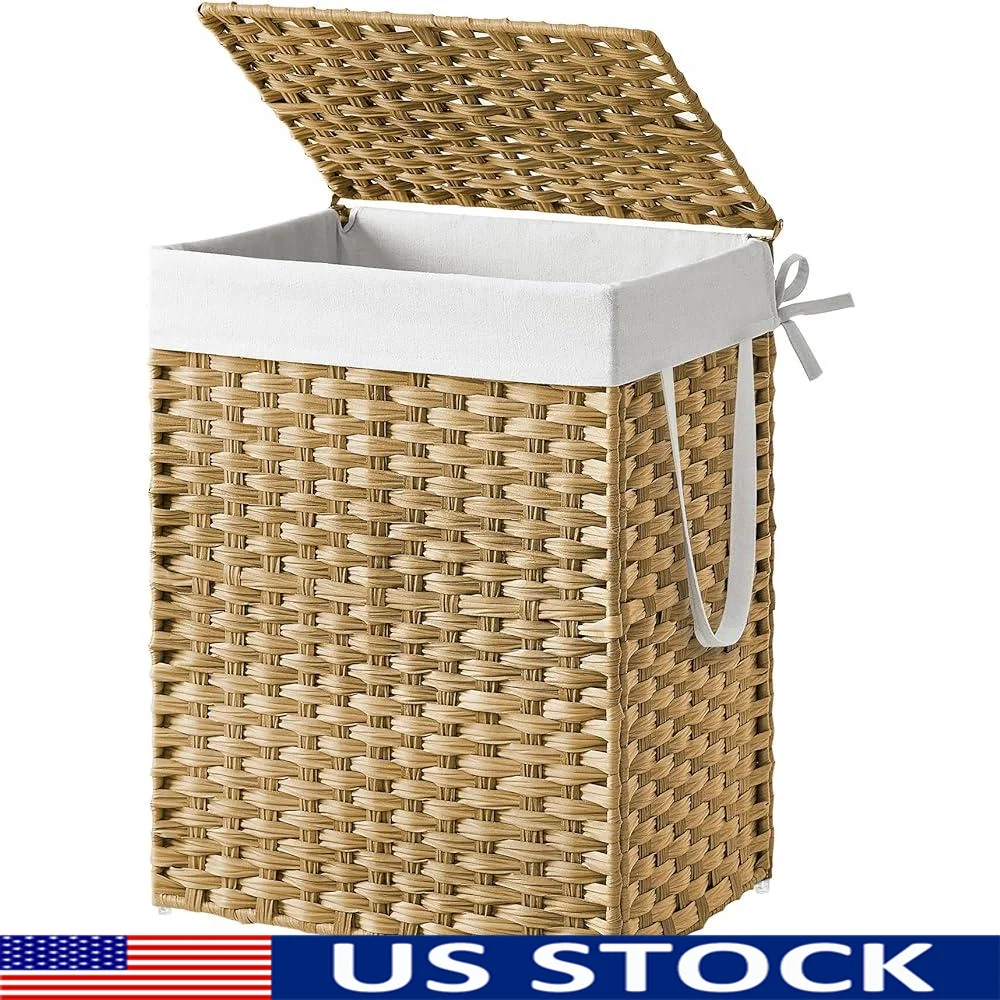
American e-commerce sites and retail stores maintain clear category distinctions that reinforce the terminology differences we’ve discussed. Major home goods retailers typically organize their inventory with these distinct categories:
- “Laundry Hampers” – For stationary dirty clothes containers
- “Laundry Baskets” – For portable clothes carriers
- “Gift Baskets” – Never labeled as “gift hampers”
- “Storage Baskets” – For decorative organizational containers
When Americans search online for these items, their search patterns reflect these terminology preferences. Common search terms include “laundry hamper with lid,” “divided laundry hamper,” “collapsible hamper,” or “decorative hamper” when looking for the laundry storage item.
Interestingly, global e-commerce has begun to blur some of these distinctions. International sellers on platforms like Amazon sometimes use British terminology like “gift hamper” in American marketplaces, potentially introducing some terminology confusion. However, established American retailers maintain the traditional distinctions in their category names and product descriptions.
The varieties of wicker laundry baskets with lids show how American retailers carefully categorize these items to match consumer expectations and search behavior.
Cultural Impact: The Hamper in American Life and Media

The laundry hamper has secured its place in American domestic culture in ways that go beyond simple utility. In American households, the hamper often becomes a symbol of domestic responsibility and family dynamics.
Common hamper-related phrases have entered everyday American language:
- “Hamper diving” – Reluctantly searching through dirty clothes for a needed item
- “Hamper mountain” or “Hamper volcano” – Humorous references to overflowing laundry
- “The hamper doesn’t fill itself” – A parental reminder about responsibility
In American television and films, the hamper makes regular appearances as a household fixture. Sitcoms frequently feature scenes of characters sorting laundry from hampers or children being assigned hamper-emptying chores. The laundry hamper has been featured in everything from household organization shows to comedy sketches about family life.
In American domestic routines, the benefits of lidded laundry hampers have become part of conventional wisdom about home organization. Many Americans view their choice of hamper as both a practical decision and a reflection of their decorating style, which explains the popularity of attractive woven laundry hampers that serve both functional and aesthetic purposes.
Conclusion: Navigating English Terminology Across Borders
As we’ve explored, what Americans call “hampers” primarily refers to containers for dirty laundry, while the gift-filled wicker baskets known as “hampers” in British English are called “gift baskets” in American terminology. This linguistic difference is just one example of how English vocabulary can vary significantly across English-speaking countries.
When encountering the word “hamper” in American context, remember that it almost certainly refers to a laundry container unless it’s being used as a verb meaning to impede or restrict. This understanding helps navigate both conversation and shopping with greater clarity.
These terminology differences remind us that language is always evolving and regionally specific, even within what appears to be a shared language. The distinctions between American and British terminology extend far beyond just hampers, creating a rich tapestry of linguistic variation.
For those seeking quality organization solutions for their homes, Tidy Treasure offers a range of options that satisfy both American and international preferences. Our comprehensive laundry solutions include both hampers and baskets designed to meet various household needs while enhancing your home’s aesthetic appeal.
Understanding these terminology differences not only prevents confusion but also helps appreciate the fascinating ways language adapts to different cultural contexts.

